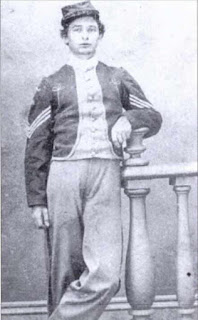July Gleanings from Coffeyville: Threshing, the Ponca Long March, and Railroad Strikes
If you read any of the other “ Gleanings,” posts, you might recall that these “seen-around-town” sort of items were a regular column in the Coffeyville, Kansas newspapers, and many newspapers, in the 1870s and 1880s. I am compiling samples for each month. One change is that if I have commentary on an item, I highlighted it. 22 July 1875 Ten days without rain. The “blue-tailed fly.” Cutting hay is in order. Wheat threshing everywhere. The mosquito is an impudent cuss. One hundred two degrees in the shade Thursday. Thomas Jesson harvested a fine crop of barley. Complaints are being made that town cows are destroying neighboring corn. Either enforce the law or repeal it. Can’t this shooting at night be stopped? Why are people permitted to continue violating city ordinances and frightening women and children with impunity? An entertainment will be given the evening of August 2nd. A variety of excellent vocal and instrumental music, select readings, tableaux , etc. will be rendered, and
